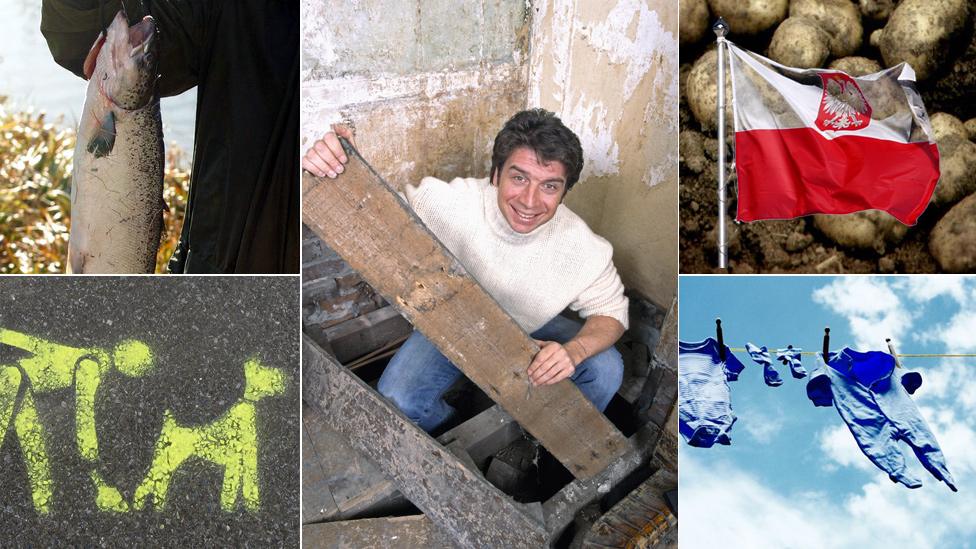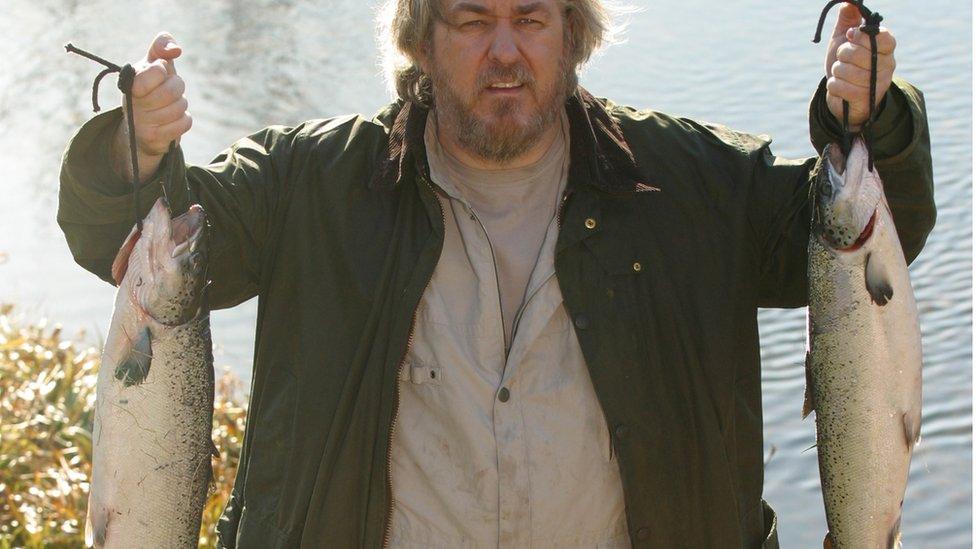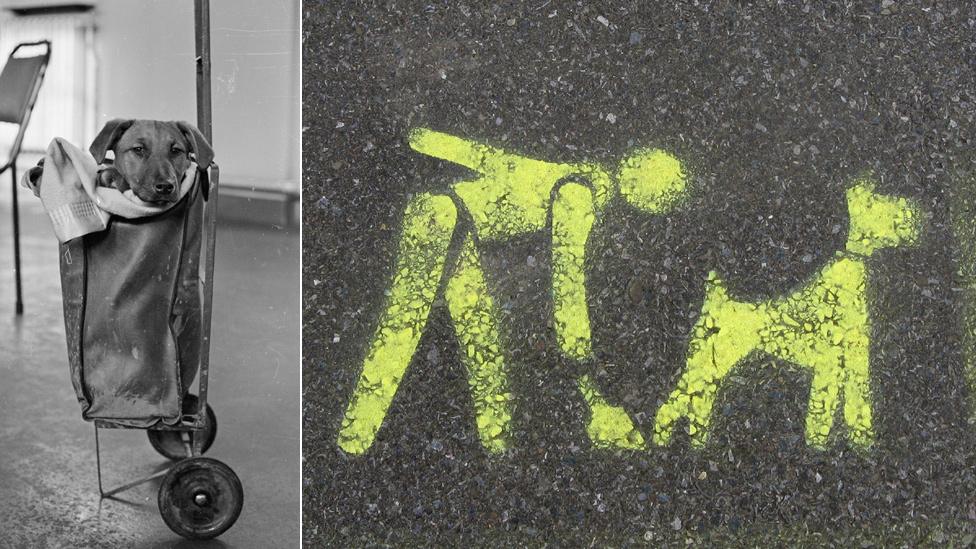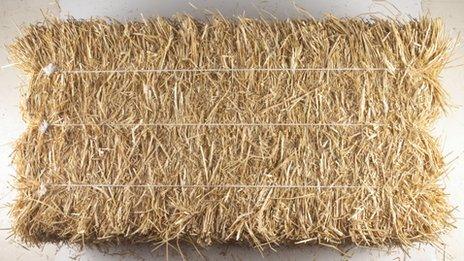Odd laws you may unknowingly break
- Published

What do these have in common? They're all subject to seemingly peculiar rules and regulations
An 800-year-old dress code banning women from taking off their hats may finally be overturned later in Norfolk. But what other old-fashioned, or just plain strange, rules are in place around England?
For centuries, women at official Thetford Town Council functions have been required to seek the mayor's permission to take their hats off. However men are trusted to use their own judgement and may discard their headwear all on their own.
The historic maxim will be mulled over at a meeting next month, after the newly-elected councillor Francesca Robinson said it was "demeaning".
So forget the urban myths about killing Welshmen with longbows or being allowed to herd your sheep over city bridges - here are some real rules you may be breaking without realising it.

Carrying a plank on a pavement

Nick Knowles would not be allowed to carry this plank on a pavement
Section 54 of the Metropolitan Police Act , externalstipulates you are not allowed to carry a plank along a pavement in London, unless you are unloading it from a vehicle.
The ban extends to casks, tubs, hoops, wheels, ladders, poles and placards.
And if you thought you would get around the rule by rolling your tub along, that's banned too.
The law is in place to prevent nuisance and increase ease of passage on public thoroughfares.
You are also not allowed to fly a kite if it could cause annoyance, slide upon ice or snow in any street in a manner which could cause injury to others, or "ride or drive furiously, or so as to endanger the life or limb of any person" in any thoroughfare.

Hanging out the washing

Not. Allowed.
Residents on a new development in Beverley, East Yorkshire, are subject to a restrictive covenant banning them from hanging out the washing or airing clean clothes outdoors.
Covenants prohibiting hanging washing in the front garden are fairly common, but the one at Westwood Park covers windows, balconies, roof terraces, communal gardens and potentially even the back gardens of individual houses on the site.
The idea behind the rule at the luxury location is to prevent peoples' smalls fluttering in the breeze, which could detract from the look of the estate.
The developers, though, did fit every home with a washer-dryer to help the enforcement of the covenant.
Other common covenants prevent occupiers from erecting fences in their front garden, keeping livestock other than domestic pets, washing their cars on the premises and removing any grassed areas.

Lingering at a funeral

Frank Blades was not ready to rush away from the graveside after laying his wife Violet to rest at Hannah Park Cemetery in Worksop, Nottingham in the summer of 2015.
He stayed for an extra 20 minutes - and was billed £160 for it.
A spokesman for the funeral directors said: "We incurred a charge of £160 from Bassetlaw District Council due to their gravediggers working beyond their contracted hours when our client wished to visit other family graves following the funeral.
"As with any third-party fee that we pay on behalf of our clients this was included in our final invoice."
Liz Prime, head of neighbourhoods at Bassetlaw District Council, said she was surprised the charge had been passed on and not absorbed by the funeral company.
"The council has certainly not penalised Mr Blades for spending additional time at his wife's graveside to mourn her loss."
Mr Blades said: "I just accepted it. I just tried to forget it. I am saying this because it might happen to other people."

Handling a salmon in suspicious circumstances

He's definitely handling salmon, but is it suspicious?
Handling a salmon in suspicious circumstances sounds like it may be an archaic law, but it is in fact enshrined in Section 32 of the Salmon Act 1986, external.
It is aimed at selling fish gained through illicit means - rather than people furtively skulking around dark corners clutching their Salmo salar, external. The phrasing is broad enough to provoke thought, however.
A five-hour House of Lords debate about the issue in February 1986 decided the wording would protect unwitting people from the then-in-place wider law of "possessing salmon which have been illegally taken, killed or landed".

Bringing Polish potatoes into England

If you want chips with your suspiciously-handled fish, make sure they're legal.
The Polish Potatoes Order 2004 makes it illegal for someone to "import into England potatoes which he knows to be or has reasonable cause to suspect to be Polish potatoes, external".
An exception is made if you write to an inspector at least two days before you plan to bring your tubers over, giving details of:
The proposed time, date and means of introduction
The proposed point of entry into England
The intended use of the potatoes
The proposed destination of the potatoes
The variety of the potatoes
The quantity of potatoes
The producer's identification number
The law was introduced in response to ring rot outbreaks in Poland.
In 2012, the Food and Environment Research Agency reinforced the guideline, by demanding a ring rot test certificate accompany the spuds.
This was triggered by a poor crop in the UK leading to importers searching for European replacements.

Chatting about the weather/babies/holidays

Contrary to appearances, Carlisle City Council "is not a holiday camp", staff were told
A rule introduced at the beginning of 2011 banned staff at Carlisle City Council from talking about anything not work-related.
If employees wanted to discuss the weather, holidays or babies (the three categories specified in the instructions), they were told to clock-out - so they would not be paid for time spent chatting.
An e-mail sent to 31 workers by two team leaders in the city's benefits department also warned staff "to be aware of the reason why they are here, which is to work and not to treat the office as a day-to-day holiday camp".
The GMB Union representative at the council, Ged Craig, said the message was "ridiculous and a disgrace - it is suggesting that if, for example, you are standing in a queue for the photocopier having a chat you should clock out."
The e-mail went on to say that the way staff previously worked could not be sustained in the "current economic climate".
Following the outrage of the staff and the involvement of the union, the rule was dropped.

Carrying an extra dog mess bag

Always remember a spare bag for your dog
Daventry Council, in Northamptonshire, introduced rules for dog walkers which decreed they can be fined up to £100 if they walk their dog without carrying a bag to dispose of its waste.
This means that if you get stopped after disposing of a used bag, you would still be susceptible to the fine.
Dogwalkers should therefore either carry a spare to flourish when challenged, or become one of those owners who keep the full bag with them.
- Published8 May 2016

- Published6 April 2012
